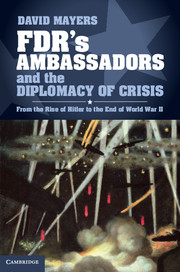7 - Great Patriotic War
from Part III - Victors
Published online by Cambridge University Press: 05 December 2012
Summary
Winant probably never knew of the existence of Anna Akhmatova or anything of that eminent poet's Requiem, wherein she chronicled the calamities of Soviet life during Stalinism. But he doubtless would have admired her resolve, even as her ordeals – censure, persecution, execution of loved ones – lay radically beyond his experience or ken. He would have appreciated too her wartime verse, written not in the official stentorian style to praise Red Army prowess and Stalinist statecraft. She celebrated a subtler heroism: “Through the bombardment is heard the voice of a child.” As German armies invaded and Nazi zealots sought to expunge all monuments of Russian civilization, she vowed this determination to defend the country's literary and ethical tradition:
And we will preserve you, Russian speech,
Mighty Russian word!
We will transmit you to our grandchildren
Free and pure and rescued from captivity
Forever!
Viewed from the perspective of her dingy Leningrad flat, immediate postwar life must have struck Akhmatova as fraught with uncertainties and dangers as it did to Winant. In her case, she was subjected to yet another blast of vilification after her two meetings (November 1945, January 1946) with British diplomat and scholar Isaiah Berlin. The Central Committee of the Communist Party declared her guilty of “eroticism, mysticism, and political indifference.” Andrei Zhdanov, arbiter of Soviet good taste, condemned her in 1946 as “half-nun, half harlot.” Her Leningrad, meanwhile, whose tribulations she had commemorated, became site to massive efforts of restoration. Innumerable buildings had been damaged past repair during the siege, September 1941 to January 1944. Transportation and communication infrastructure was mangled. Water works and electrical power were smashed. Hundreds of thousands of Leningraders – a million noncombatants – had died from starvation, exposure, or shelling. Of them, Akhmatova had written:
Everyone down on your knees!
A crimson light pours!
And the Leningraders come through the smoke
in even rows –
The living and the dead: for glory never dies.
- Type
- Chapter
- Information
- FDR's Ambassadors and the Diplomacy of CrisisFrom the Rise of Hitler to the End of World War II, pp. 204 - 248Publisher: Cambridge University PressPrint publication year: 2012



